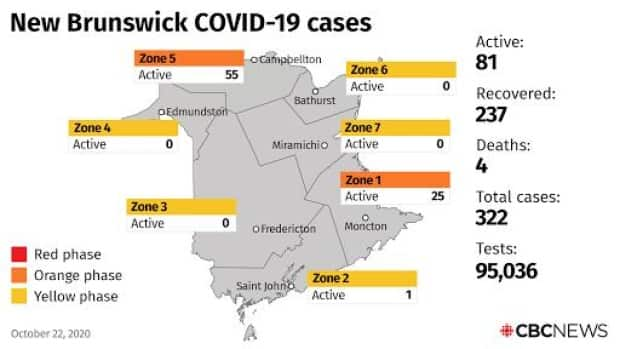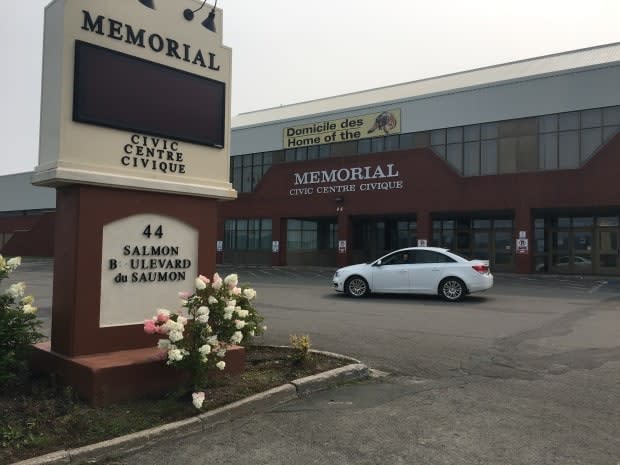N.B. COVID-19 roundup: Campbellton region 'on verge' of return to red phase after new cases
More restrictions have been announced for the Campbellton region, which recorded three new cases of COVID-19 Thursday, almost two weeks after it was pushed back to the orange phase of recovery.
The new cases consist of one person in their 40s and two in their 50s.
While Zone 5 will remain in the orange stage, people will be limited to interacting with a single household bubble, Chief Medical Officer of Health Dr. Jennifer Russell said.
Meanwhile, Belledune, which is not in Zone 5, will have to follow the new restrictions, and Kedgwick, which is in Zone 5, will be exempt.
Russell said there are four separate chains of infection in the region that cannot be linked.
"This is a strong indication that community spread is happening," she said.
Premier Blaine Higgs said he'd hoped that by moving the region back earlier this month from yellow to orange in the recovery process that the spread of the virus would be contained. That hasn't happened, he said, and about 300 people are now self-isolating in the region because they're at risk of developing COVID-19.

And while the zone technically remains at orange, that may not be the case for long.
"When I think about [the] Campbellton region and Zone 5, I think … we're on the verge of going back," Higgs said, referring to the red phase that the whole province was placed under early in the pandemic.
"We do not want to ... turn it into a red. We are on the verge of making a decision, though, that would significantly impact the economy and the livelihoods."
Higgs said travel into and out of the zone is "highly discouraged" but stopped short of saying it was forbidden.

Under the red stage, which is still a possibility for the region, all elective and non-urgent medical procedures would be postponed.
K-12 schools would become virtual only but daycares would remain open. Restaurants would only be able to offer drive-thru, delivery or takeout. and only drive-in church services would be allowed
Gyms, cinemas and barbers world remain closed but most retail businesses could remain open as long as they had an operational plan.
Provincial guidelines give four criteria for when a red stage could be introduced: three unlinked chains of community transmission in six days, the health-care system being overwhelmed, outbreaks not being controlled through testing and public health measures not being effective.
There are now 81 active cases of COVID-19 in New Brunswick. There were 714 tests for the virus in the province on Wednesday, bringing the total number of tests to 95,036.
The province has had 322 total cases since the pandemic began with 237 recoveries and four deaths.
Five people are now hospitalized because of the virus, including one in intensive care.
Higgs doesn't rule fines for violators
The province released some sobering statistics about the outbreak in the Campbellton region.
Over 16 days in October, the provincial positive test average was less than one per cent, but in Zone 5 it was 4.24 per cent.
While the province has an average of 14.39 cases per 100,000 "in Zone 5 the ratio is 245 cases per 100,000 people," and "COVID-19 is more prevalent in Zone 5 than anywhere else in Atlantic Canada."
Russell said she understands some residents may feel shamed and she's not looking to blame anyone for the outbreak, but she suggested people living in the area were not limiting their social contacts as much as they should be.
"Expanding the household bubbles too widely, obviously in the situation that is happening right now in the Campbellton-Restigouche area, we cannot maintain,"
Higgs said he had hoped that returning Zone 5 to the orange level would be enough to lower rates of transmission, but it has not been, which necessitated the increased restrictions.
"We will assess these activities through testing, through adherence, through additional staffing of compliance officers and, yes, fines if necessary, because we must get back under control," said Higgs.
Moncton moves forward to yellow again
While restrictions are increasing in Zone 5, the government is loosening restrictions in Zone 1, the Moncton region, although both have had outbreaks in recent weeks.
Moncton's active cases now stand at 25, and Dr. Jennifer Russell, the chief medical health officer, said its' outbreak has been brought under control. The first cases in the Moncton outbreak were reported the first week of October, and the outbreak went on to include residents, staff and family at the Manoir Notre-Dame special care home.
"We are seeing fewer cases related to that outbreak and have identified links among all the reported cases," Russell said Thursday.
With no new cases in Zone 1, the region will move Friday from orange to the less restrictive yellow stage of COVID-19 recovery. All other health zones, with the exception of the Campbellton region, have been under some stage of the yellow phase since May 22.

Under yellow, Zone 1 residents will be able to meet with people beyond a two-family bubble although, as in the rest of the province, they should limit groups.
Uncontrolled indoor or outdoor gatherings with physical distancing can be held with crowds of 50 or fewer.
Gyms, cinemas and hair-styling businesses can also reopen in yellow
Zones 5 will be the only health region of the province in the orange stage of recovery as of midnight Thursday night. Everywhere else will be in the yellow stage.
Case at NB Power plant
As Belledune has moved back into the orange stage of recovery CBC News has learned that an employee of NB Power's Belledune Generating Station in the village has tested positive for COVID-19.
Joe Noel, the mayor of Belledune, said NB Power informed him of the positive test on Sunday.
"They said they had someone who had tested positive and that some other employees were being tested," said Noel.
Noel said he didn't know if the worker was from Belledune or from another community.
During her briefing on Thursday, Russell would not confirm there was a case at the Belledune plant or if the case was the reason for the area being moved into the orange stage. She cited privacy reasons.
"The decision around … Belledune in terms of how they're included or not included in Zone 5 is based on our risk assessment," Russell said.
NB Power also declined to comment on the case at the plant.
"Any questions related to COVID should be directed to Public Health," said NB Power spokesperson Marc Belliveau.
Mass testing for Zone 5 this weekend
Public Health and Vitalité Health Network will hold two days of mass testing for COVID-19 in the Campbellton region, or Zone 5, on Saturday and Sunday.
"The objective is to get an accurate picture of the prevalence of the virus in the community given the current outbreak in that region," Vitalité spokesperson Thomas Lizotte said in a release Thursday.
As of Wednesday, there were 57 actives COVID cases in Zone 5, and it remains in the orange phase of recovery, behind almost all other health zones in the province. Moncton is also in orange but could move to the less restrictive yellow phase on Friday.
This week, the province also recorded the fourth death related to COVID-19, Dalhousie resident, Rheal Vautour, 71.
Saturday's testing will be held at the Memorial Regional Civic Centre in Campbellton and Sunday's will be in Dalhousie at Inch Arran Arena. Testing will be done from 9 a.m. to 7 p.m. each day.
Lizotte said appointments aren't necessary, but each person needs to have a New Brunswick Medicare card.
"Screening tests will be done on a first come, first served basis."
Those attending are advised to dress warmly since people will be waiting outside at times.
"All testing done during these two days is only intended for people who do not have any symptoms of COVID-19," Lizotte said in the release.Those with symptoms are asked to request a test online or call Tele-Care 811 to get an appointment at the nearest screening centre.
"The network would like to remind people about the importance of following health advice to protect themselves and their loved ones, which is to wear a mask, maintain two metres of physical distancing and wash their hands often."
Mass testing was conducted in Restigouche County during Zone 5's first outbreak in June.
Dalhousie high school remains closed after 2nd case reported
Dalhousie Regional High School remained closed Thursday and Friday after a second case of COVID-19 was confirmed at the northern New Brunswick school.
Public Health said the second case has no connection with the previously identified case at the school in Dalhousie.

A decision on when the school will reopen will be made Friday, Anglophone School District North superintendent Mark Donovan advised parents and guardians in a letter posted on the school's website and Facebook page.
Students from Grade 6 to 12 will continue virtual learning until then.
Students expected to show up when schools open
Six schools in Zone 5, the Campbellton region, have had confirmed cases of COVID-19, including all four schools in Dalhousie, one in Campbellton and one in Balmoral.
And Anglophone School District North says all students are expected to attend school unless they have a doctor's note.
"If parents choose to keep students home when schools are open, there is no expectation for teachers to provide work for those students," superintendent Mark Donovan told parents and guardians in a letter published online.
Donovan said schools or classrooms would be closed for one of two reasons: by direction of Public Health or because of operational problem. One operational issue would be an inability to find replacement staff or supply teachers.
"A classroom or school may need to close, simply because there are not enough staff to operate the class/building."
No student-to-student transmission has been recorded in any school to date, said Public Health.
What to do if you have a symptom
People concerned they might have COVID-19 symptoms can take a self-assessment test on the government website at gnb.ca.
Public Health says symptoms shown by people with COVID-19 have included: a fever above 38 C, a new cough or worsening chronic cough, sore throat, runny nose, headache, new onset of fatigue, new onset of muscle pain, diarrhea, loss of sense of taste or smell, and difficulty breathing.
In children, symptoms have also included purple markings on the fingers and toes.
People with one of those symptoms should:
Stay at home.
Call Tele-Care 811 or their doctor.
Describe symptoms and travel history.
Follow instructions.


